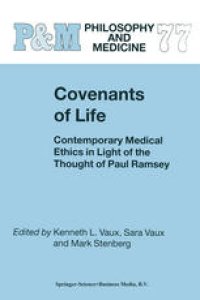
Ebook: Covenants of Life: Contemporary Medical Ethics in Light of the Thought of Paul Ramsey
- Tags: Ethics, Religious Studies
- Series: Philosophy and Medicine 77
- Year: 2002
- Publisher: Springer Netherlands
- Edition: 1
- Language: English
- pdf
The intense fervor of a Mississippi Methodist preacher, the meticulous reasoning of an Oxford logician, the dogged persistence of a head longshoreman, the unflagging humor of a Rabelaisian satirist. To have met Paul Ramsey at a lecture in a medical university; a heady conference at Hastings-on Hudson; a congressional hearing; deliberations at a church assembly; or a bull session in some coffee shop was to be confronted with a gentleman of unforgettable energy, insight, and delight. In many roles--as a young instructor in religious studies at Princeton University, a concerned moral theologian commenting on the ethics of the "sit-ins" and nuclear issues, an observer and dialogue partner with physicians at Georgetown and other medical centers, a faithful editor and analyst of Jonathan Edwards' ethical writings, a trustee of the Hastings center, a voluminous correspondent with others who would join to disciplined pursuit of values--Paul Ramsey in all roles was indefatigable in zeal, rigorous in demand and gracious in coadventuring (to use one of his wonderful metaphors). This volume captures a unique exchange between Paul Ramsey and his most prominent colleagues. In one sense it remains a Festschrift in his honor, characterized, at times, by a markedly informal tone.
This volume captures a unique exchange between Paul Ramsey and his most prominent colleagues. In one sense it remains a Festschrift in his honor, characterized, at times, by a markedly informal tone. Yet, in the spirit of both the analytical rigor and the self-exposure that marked Ramsey's career, this volume is not simply a tribute to Ramsey's lifework but rather a vehicle for intense conversation and argument about issues of human birth, life, suffering, and death. The editors see it as a state of the art discussion that brings the best insights from Judeo-Christian thought into contact with wider and more public arenas of medical ethics. Of course, such a collection as this grants Ramsey the permission to have the last word. But this final word is entrusted to a mature and remarkably open mind, still sharpening its critical skills and risking exposure to new issues and voices.